BUSN3035 Employee Relations: Neoliberalism's Impact in Australia
VerifiedAdded on 2023/06/04
|14
|3685
|99
Essay
AI Summary
This essay explores the impact of neoliberalism on Australian employment relations, drawing on theoretical arguments and current research. It examines how neoliberal policies, influenced by open market competition, affect employment laws and the treatment of marginalized groups, particularly people with disabilities. The essay discusses the challenges faced by the disabled in the Australian workplace, including discrimination and low remuneration, and analyzes the decline in union membership and increased job turnover due to neoliberal reforms. It also considers the role of government policies, such as the Disability Discrimination Act and the Welfare to Work Act, in addressing these issues. The essay concludes by emphasizing the need for structural changes and equal treatment to improve employment relations and protect the rights of vulnerable employees. Desklib provides students access to similar solved assignments and study material to help them with their academic needs.
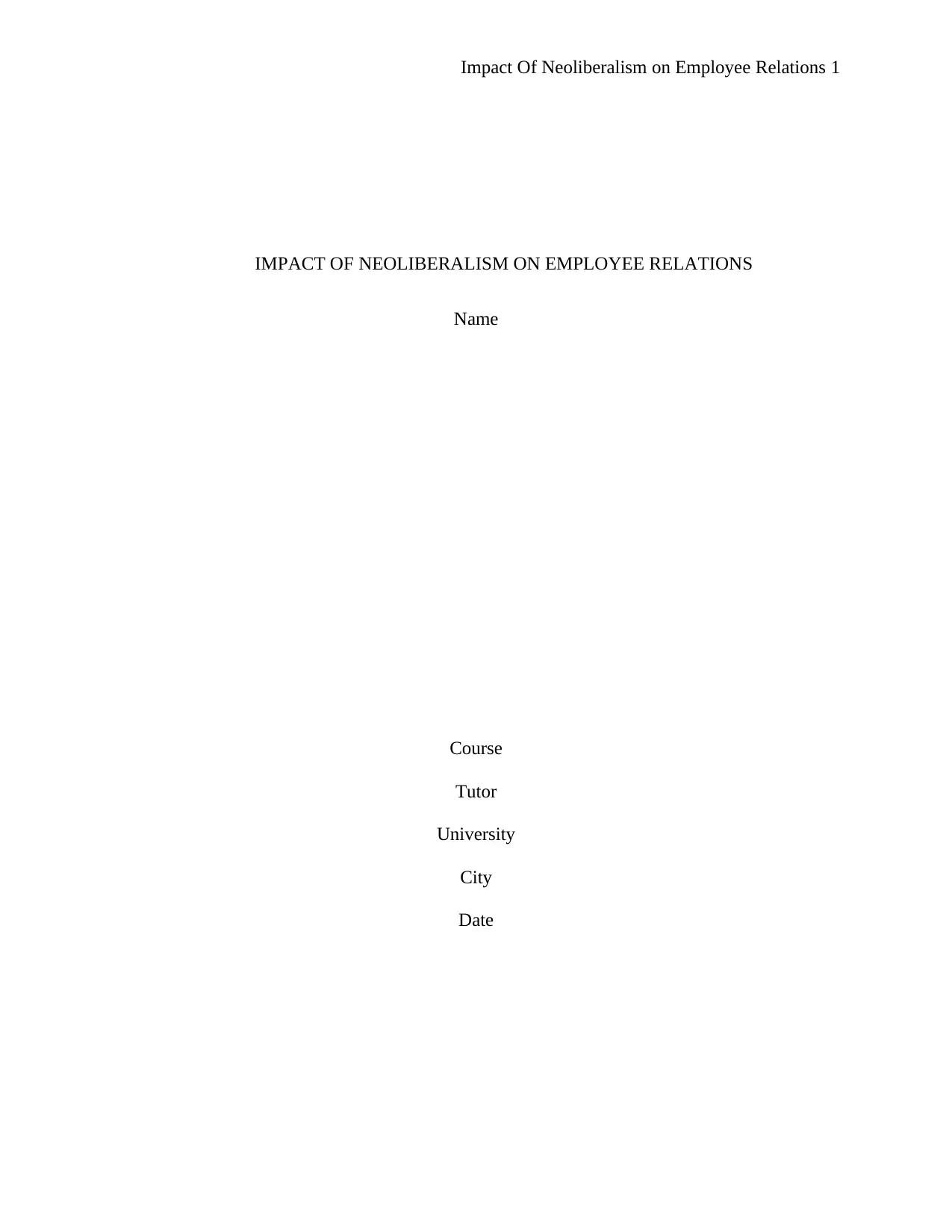
Impact Of Neoliberalism on Employee Relations 1
IMPACT OF NEOLIBERALISM ON EMPLOYEE RELATIONS
Name
Course
Tutor
University
City
Date
IMPACT OF NEOLIBERALISM ON EMPLOYEE RELATIONS
Name
Course
Tutor
University
City
Date
Paraphrase This Document
Need a fresh take? Get an instant paraphrase of this document with our AI Paraphraser
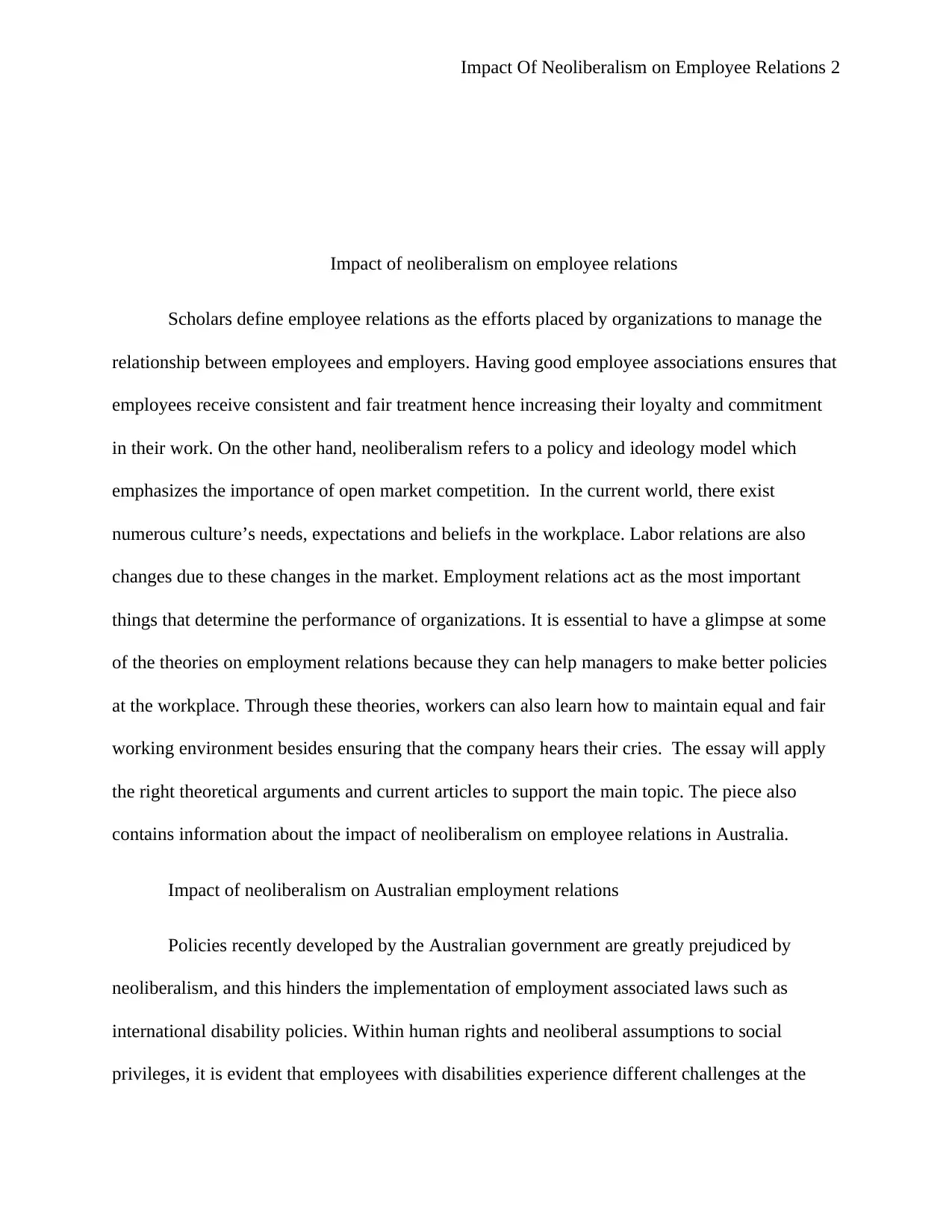
Impact Of Neoliberalism on Employee Relations 2
Impact of neoliberalism on employee relations
Scholars define employee relations as the efforts placed by organizations to manage the
relationship between employees and employers. Having good employee associations ensures that
employees receive consistent and fair treatment hence increasing their loyalty and commitment
in their work. On the other hand, neoliberalism refers to a policy and ideology model which
emphasizes the importance of open market competition. In the current world, there exist
numerous culture’s needs, expectations and beliefs in the workplace. Labor relations are also
changes due to these changes in the market. Employment relations act as the most important
things that determine the performance of organizations. It is essential to have a glimpse at some
of the theories on employment relations because they can help managers to make better policies
at the workplace. Through these theories, workers can also learn how to maintain equal and fair
working environment besides ensuring that the company hears their cries. The essay will apply
the right theoretical arguments and current articles to support the main topic. The piece also
contains information about the impact of neoliberalism on employee relations in Australia.
Impact of neoliberalism on Australian employment relations
Policies recently developed by the Australian government are greatly prejudiced by
neoliberalism, and this hinders the implementation of employment associated laws such as
international disability policies. Within human rights and neoliberal assumptions to social
privileges, it is evident that employees with disabilities experience different challenges at the
Impact of neoliberalism on employee relations
Scholars define employee relations as the efforts placed by organizations to manage the
relationship between employees and employers. Having good employee associations ensures that
employees receive consistent and fair treatment hence increasing their loyalty and commitment
in their work. On the other hand, neoliberalism refers to a policy and ideology model which
emphasizes the importance of open market competition. In the current world, there exist
numerous culture’s needs, expectations and beliefs in the workplace. Labor relations are also
changes due to these changes in the market. Employment relations act as the most important
things that determine the performance of organizations. It is essential to have a glimpse at some
of the theories on employment relations because they can help managers to make better policies
at the workplace. Through these theories, workers can also learn how to maintain equal and fair
working environment besides ensuring that the company hears their cries. The essay will apply
the right theoretical arguments and current articles to support the main topic. The piece also
contains information about the impact of neoliberalism on employee relations in Australia.
Impact of neoliberalism on Australian employment relations
Policies recently developed by the Australian government are greatly prejudiced by
neoliberalism, and this hinders the implementation of employment associated laws such as
international disability policies. Within human rights and neoliberal assumptions to social
privileges, it is evident that employees with disabilities experience different challenges at the
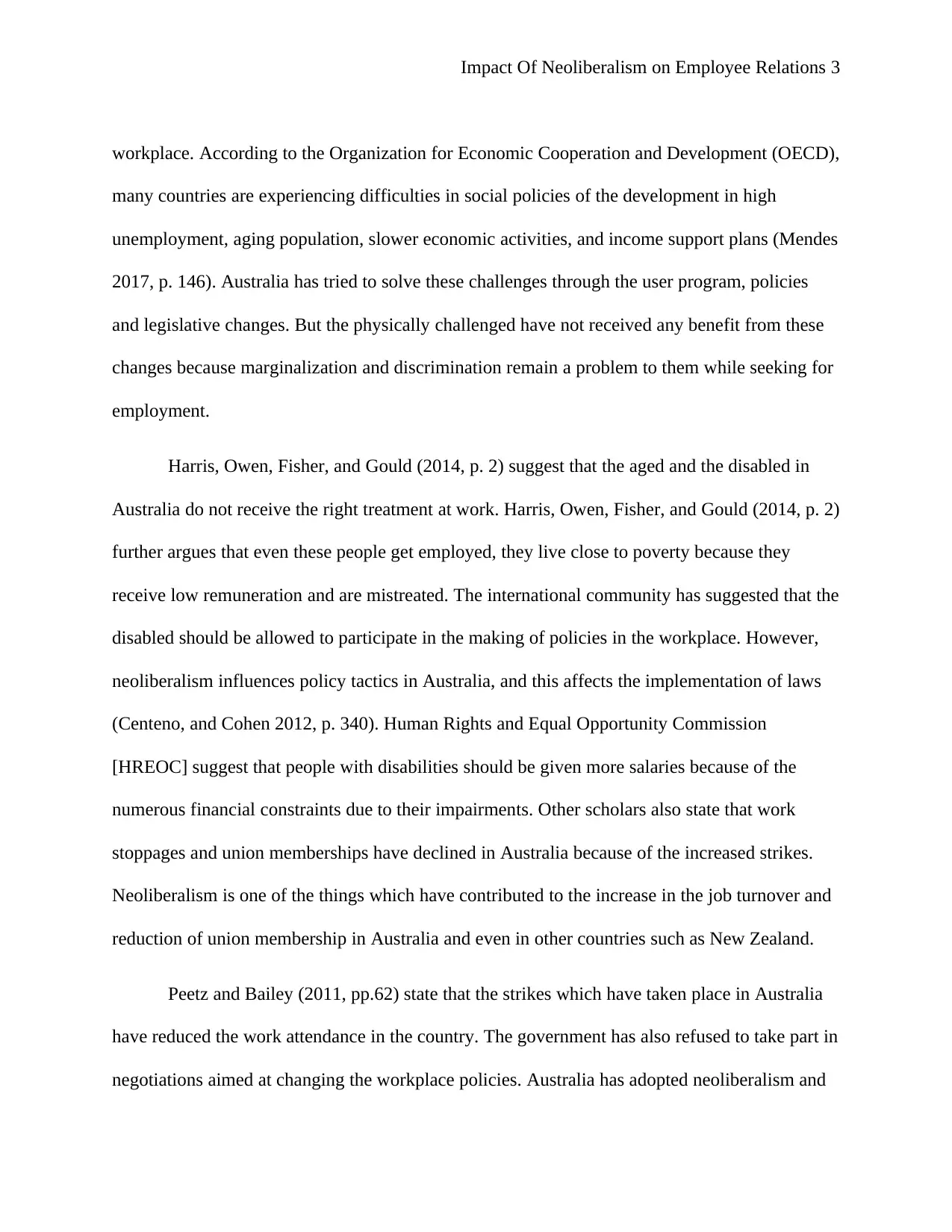
Impact Of Neoliberalism on Employee Relations 3
workplace. According to the Organization for Economic Cooperation and Development (OECD),
many countries are experiencing difficulties in social policies of the development in high
unemployment, aging population, slower economic activities, and income support plans (Mendes
2017, p. 146). Australia has tried to solve these challenges through the user program, policies
and legislative changes. But the physically challenged have not received any benefit from these
changes because marginalization and discrimination remain a problem to them while seeking for
employment.
Harris, Owen, Fisher, and Gould (2014, p. 2) suggest that the aged and the disabled in
Australia do not receive the right treatment at work. Harris, Owen, Fisher, and Gould (2014, p. 2)
further argues that even these people get employed, they live close to poverty because they
receive low remuneration and are mistreated. The international community has suggested that the
disabled should be allowed to participate in the making of policies in the workplace. However,
neoliberalism influences policy tactics in Australia, and this affects the implementation of laws
(Centeno, and Cohen 2012, p. 340). Human Rights and Equal Opportunity Commission
[HREOC] suggest that people with disabilities should be given more salaries because of the
numerous financial constraints due to their impairments. Other scholars also state that work
stoppages and union memberships have declined in Australia because of the increased strikes.
Neoliberalism is one of the things which have contributed to the increase in the job turnover and
reduction of union membership in Australia and even in other countries such as New Zealand.
Peetz and Bailey (2011, pp.62) state that the strikes which have taken place in Australia
have reduced the work attendance in the country. The government has also refused to take part in
negotiations aimed at changing the workplace policies. Australia has adopted neoliberalism and
workplace. According to the Organization for Economic Cooperation and Development (OECD),
many countries are experiencing difficulties in social policies of the development in high
unemployment, aging population, slower economic activities, and income support plans (Mendes
2017, p. 146). Australia has tried to solve these challenges through the user program, policies
and legislative changes. But the physically challenged have not received any benefit from these
changes because marginalization and discrimination remain a problem to them while seeking for
employment.
Harris, Owen, Fisher, and Gould (2014, p. 2) suggest that the aged and the disabled in
Australia do not receive the right treatment at work. Harris, Owen, Fisher, and Gould (2014, p. 2)
further argues that even these people get employed, they live close to poverty because they
receive low remuneration and are mistreated. The international community has suggested that the
disabled should be allowed to participate in the making of policies in the workplace. However,
neoliberalism influences policy tactics in Australia, and this affects the implementation of laws
(Centeno, and Cohen 2012, p. 340). Human Rights and Equal Opportunity Commission
[HREOC] suggest that people with disabilities should be given more salaries because of the
numerous financial constraints due to their impairments. Other scholars also state that work
stoppages and union memberships have declined in Australia because of the increased strikes.
Neoliberalism is one of the things which have contributed to the increase in the job turnover and
reduction of union membership in Australia and even in other countries such as New Zealand.
Peetz and Bailey (2011, pp.62) state that the strikes which have taken place in Australia
have reduced the work attendance in the country. The government has also refused to take part in
negotiations aimed at changing the workplace policies. Australia has adopted neoliberalism and
⊘ This is a preview!⊘
Do you want full access?
Subscribe today to unlock all pages.

Trusted by 1+ million students worldwide
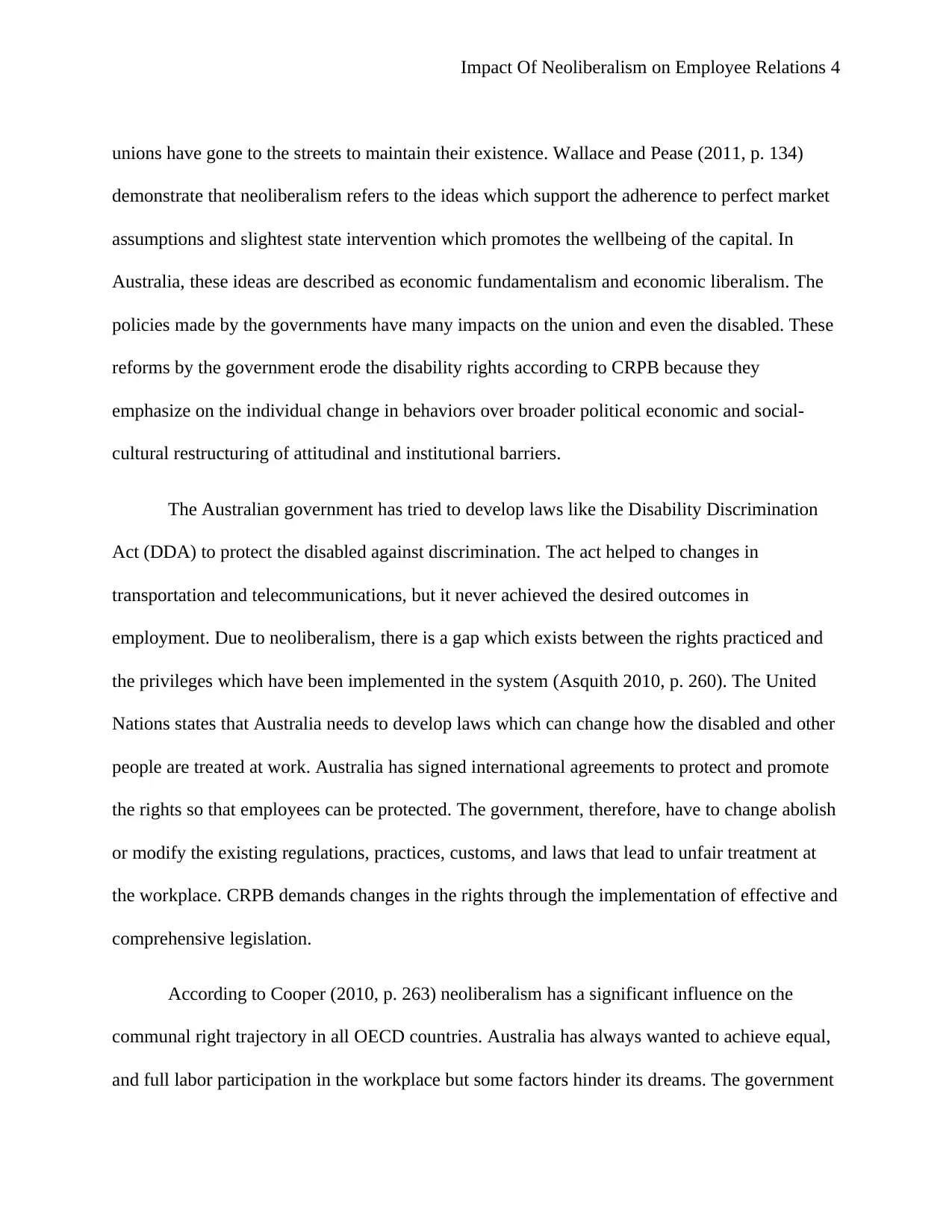
Impact Of Neoliberalism on Employee Relations 4
unions have gone to the streets to maintain their existence. Wallace and Pease (2011, p. 134)
demonstrate that neoliberalism refers to the ideas which support the adherence to perfect market
assumptions and slightest state intervention which promotes the wellbeing of the capital. In
Australia, these ideas are described as economic fundamentalism and economic liberalism. The
policies made by the governments have many impacts on the union and even the disabled. These
reforms by the government erode the disability rights according to CRPB because they
emphasize on the individual change in behaviors over broader political economic and social-
cultural restructuring of attitudinal and institutional barriers.
The Australian government has tried to develop laws like the Disability Discrimination
Act (DDA) to protect the disabled against discrimination. The act helped to changes in
transportation and telecommunications, but it never achieved the desired outcomes in
employment. Due to neoliberalism, there is a gap which exists between the rights practiced and
the privileges which have been implemented in the system (Asquith 2010, p. 260). The United
Nations states that Australia needs to develop laws which can change how the disabled and other
people are treated at work. Australia has signed international agreements to protect and promote
the rights so that employees can be protected. The government, therefore, have to change abolish
or modify the existing regulations, practices, customs, and laws that lead to unfair treatment at
the workplace. CRPB demands changes in the rights through the implementation of effective and
comprehensive legislation.
According to Cooper (2010, p. 263) neoliberalism has a significant influence on the
communal right trajectory in all OECD countries. Australia has always wanted to achieve equal,
and full labor participation in the workplace but some factors hinder its dreams. The government
unions have gone to the streets to maintain their existence. Wallace and Pease (2011, p. 134)
demonstrate that neoliberalism refers to the ideas which support the adherence to perfect market
assumptions and slightest state intervention which promotes the wellbeing of the capital. In
Australia, these ideas are described as economic fundamentalism and economic liberalism. The
policies made by the governments have many impacts on the union and even the disabled. These
reforms by the government erode the disability rights according to CRPB because they
emphasize on the individual change in behaviors over broader political economic and social-
cultural restructuring of attitudinal and institutional barriers.
The Australian government has tried to develop laws like the Disability Discrimination
Act (DDA) to protect the disabled against discrimination. The act helped to changes in
transportation and telecommunications, but it never achieved the desired outcomes in
employment. Due to neoliberalism, there is a gap which exists between the rights practiced and
the privileges which have been implemented in the system (Asquith 2010, p. 260). The United
Nations states that Australia needs to develop laws which can change how the disabled and other
people are treated at work. Australia has signed international agreements to protect and promote
the rights so that employees can be protected. The government, therefore, have to change abolish
or modify the existing regulations, practices, customs, and laws that lead to unfair treatment at
the workplace. CRPB demands changes in the rights through the implementation of effective and
comprehensive legislation.
According to Cooper (2010, p. 263) neoliberalism has a significant influence on the
communal right trajectory in all OECD countries. Australia has always wanted to achieve equal,
and full labor participation in the workplace but some factors hinder its dreams. The government
Paraphrase This Document
Need a fresh take? Get an instant paraphrase of this document with our AI Paraphraser
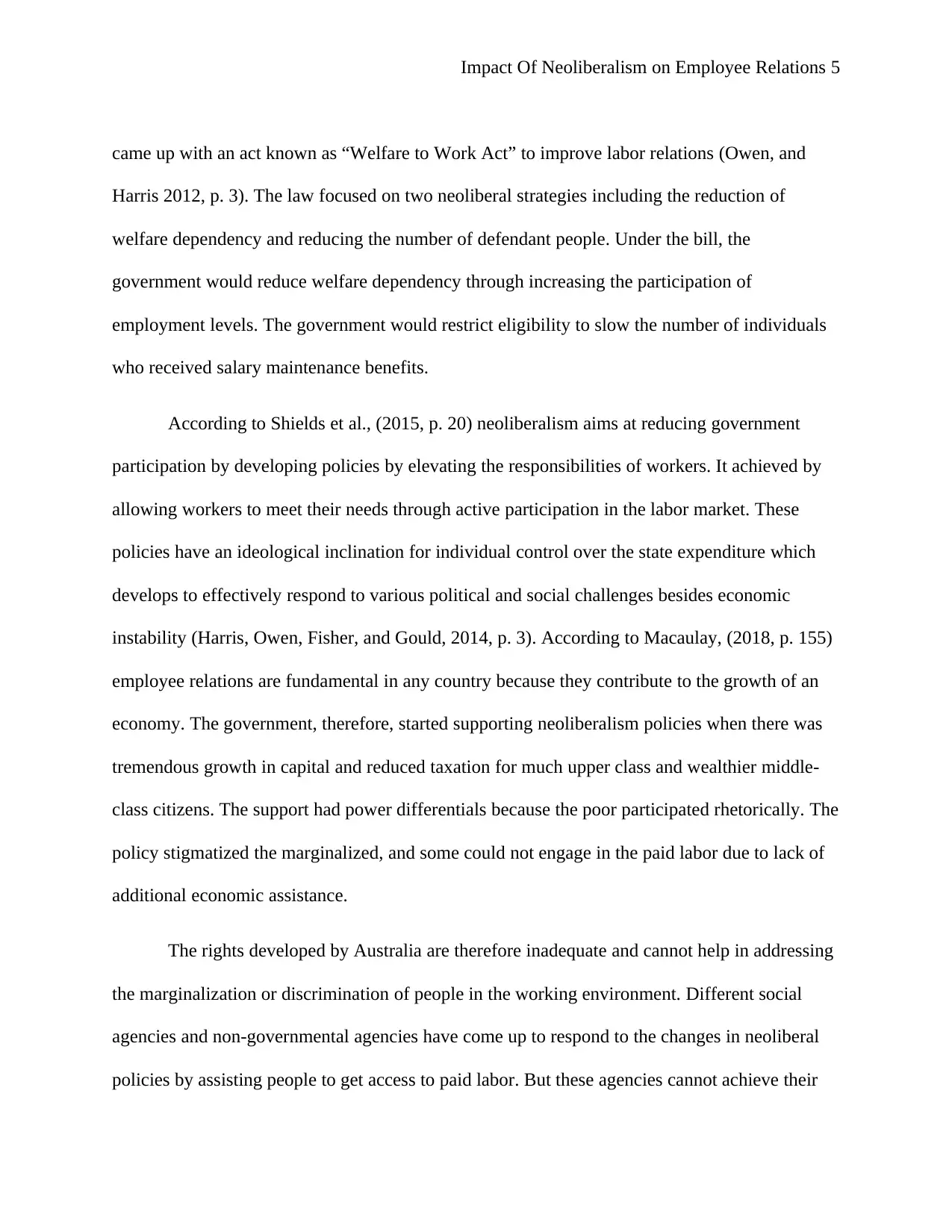
Impact Of Neoliberalism on Employee Relations 5
came up with an act known as “Welfare to Work Act” to improve labor relations (Owen, and
Harris 2012, p. 3). The law focused on two neoliberal strategies including the reduction of
welfare dependency and reducing the number of defendant people. Under the bill, the
government would reduce welfare dependency through increasing the participation of
employment levels. The government would restrict eligibility to slow the number of individuals
who received salary maintenance benefits.
According to Shields et al., (2015, p. 20) neoliberalism aims at reducing government
participation by developing policies by elevating the responsibilities of workers. It achieved by
allowing workers to meet their needs through active participation in the labor market. These
policies have an ideological inclination for individual control over the state expenditure which
develops to effectively respond to various political and social challenges besides economic
instability (Harris, Owen, Fisher, and Gould, 2014, p. 3). According to Macaulay, (2018, p. 155)
employee relations are fundamental in any country because they contribute to the growth of an
economy. The government, therefore, started supporting neoliberalism policies when there was
tremendous growth in capital and reduced taxation for much upper class and wealthier middle-
class citizens. The support had power differentials because the poor participated rhetorically. The
policy stigmatized the marginalized, and some could not engage in the paid labor due to lack of
additional economic assistance.
The rights developed by Australia are therefore inadequate and cannot help in addressing
the marginalization or discrimination of people in the working environment. Different social
agencies and non-governmental agencies have come up to respond to the changes in neoliberal
policies by assisting people to get access to paid labor. But these agencies cannot achieve their
came up with an act known as “Welfare to Work Act” to improve labor relations (Owen, and
Harris 2012, p. 3). The law focused on two neoliberal strategies including the reduction of
welfare dependency and reducing the number of defendant people. Under the bill, the
government would reduce welfare dependency through increasing the participation of
employment levels. The government would restrict eligibility to slow the number of individuals
who received salary maintenance benefits.
According to Shields et al., (2015, p. 20) neoliberalism aims at reducing government
participation by developing policies by elevating the responsibilities of workers. It achieved by
allowing workers to meet their needs through active participation in the labor market. These
policies have an ideological inclination for individual control over the state expenditure which
develops to effectively respond to various political and social challenges besides economic
instability (Harris, Owen, Fisher, and Gould, 2014, p. 3). According to Macaulay, (2018, p. 155)
employee relations are fundamental in any country because they contribute to the growth of an
economy. The government, therefore, started supporting neoliberalism policies when there was
tremendous growth in capital and reduced taxation for much upper class and wealthier middle-
class citizens. The support had power differentials because the poor participated rhetorically. The
policy stigmatized the marginalized, and some could not engage in the paid labor due to lack of
additional economic assistance.
The rights developed by Australia are therefore inadequate and cannot help in addressing
the marginalization or discrimination of people in the working environment. Different social
agencies and non-governmental agencies have come up to respond to the changes in neoliberal
policies by assisting people to get access to paid labor. But these agencies cannot achieve their
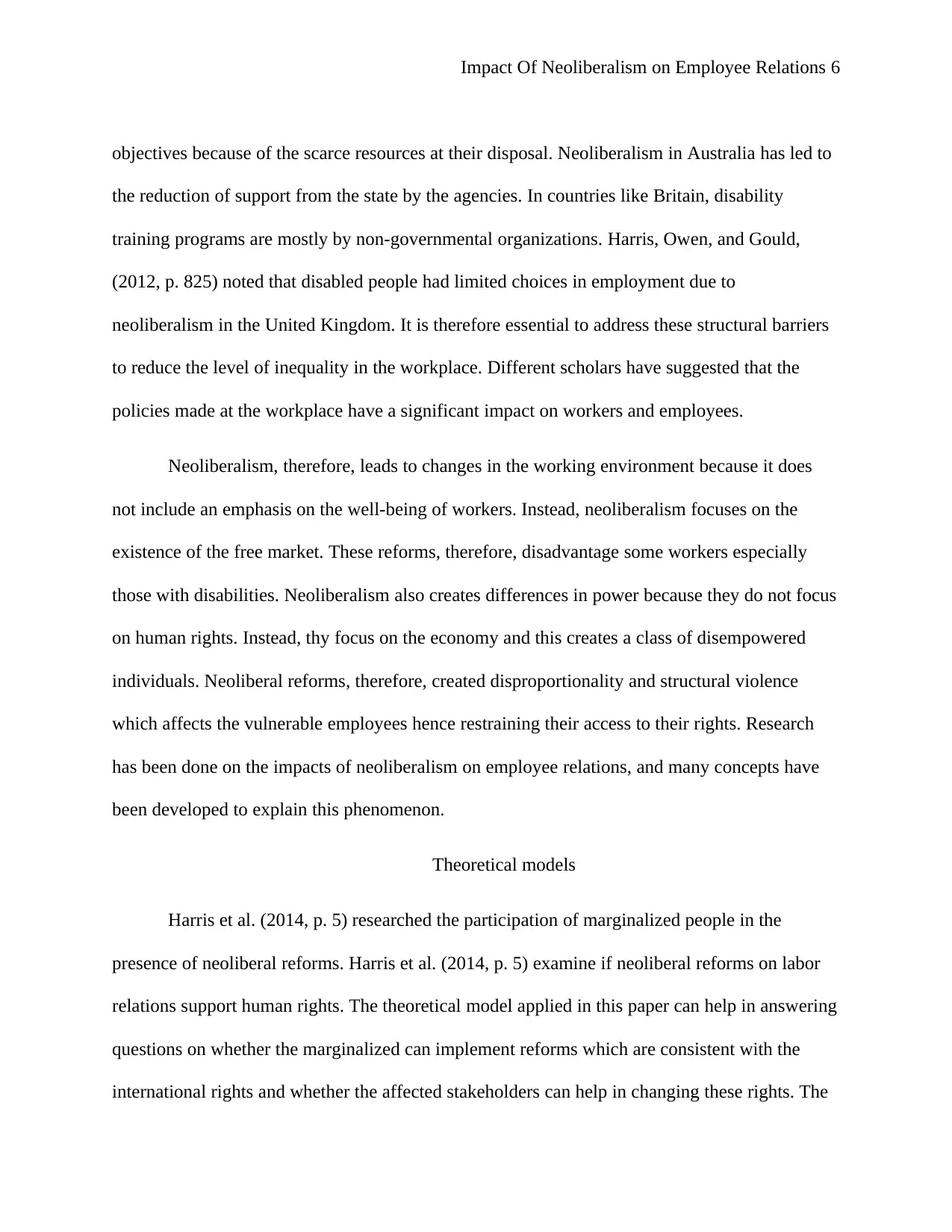
Impact Of Neoliberalism on Employee Relations 6
objectives because of the scarce resources at their disposal. Neoliberalism in Australia has led to
the reduction of support from the state by the agencies. In countries like Britain, disability
training programs are mostly by non-governmental organizations. Harris, Owen, and Gould,
(2012, p. 825) noted that disabled people had limited choices in employment due to
neoliberalism in the United Kingdom. It is therefore essential to address these structural barriers
to reduce the level of inequality in the workplace. Different scholars have suggested that the
policies made at the workplace have a significant impact on workers and employees.
Neoliberalism, therefore, leads to changes in the working environment because it does
not include an emphasis on the well-being of workers. Instead, neoliberalism focuses on the
existence of the free market. These reforms, therefore, disadvantage some workers especially
those with disabilities. Neoliberalism also creates differences in power because they do not focus
on human rights. Instead, thy focus on the economy and this creates a class of disempowered
individuals. Neoliberal reforms, therefore, created disproportionality and structural violence
which affects the vulnerable employees hence restraining their access to their rights. Research
has been done on the impacts of neoliberalism on employee relations, and many concepts have
been developed to explain this phenomenon.
Theoretical models
Harris et al. (2014, p. 5) researched the participation of marginalized people in the
presence of neoliberal reforms. Harris et al. (2014, p. 5) examine if neoliberal reforms on labor
relations support human rights. The theoretical model applied in this paper can help in answering
questions on whether the marginalized can implement reforms which are consistent with the
international rights and whether the affected stakeholders can help in changing these rights. The
objectives because of the scarce resources at their disposal. Neoliberalism in Australia has led to
the reduction of support from the state by the agencies. In countries like Britain, disability
training programs are mostly by non-governmental organizations. Harris, Owen, and Gould,
(2012, p. 825) noted that disabled people had limited choices in employment due to
neoliberalism in the United Kingdom. It is therefore essential to address these structural barriers
to reduce the level of inequality in the workplace. Different scholars have suggested that the
policies made at the workplace have a significant impact on workers and employees.
Neoliberalism, therefore, leads to changes in the working environment because it does
not include an emphasis on the well-being of workers. Instead, neoliberalism focuses on the
existence of the free market. These reforms, therefore, disadvantage some workers especially
those with disabilities. Neoliberalism also creates differences in power because they do not focus
on human rights. Instead, thy focus on the economy and this creates a class of disempowered
individuals. Neoliberal reforms, therefore, created disproportionality and structural violence
which affects the vulnerable employees hence restraining their access to their rights. Research
has been done on the impacts of neoliberalism on employee relations, and many concepts have
been developed to explain this phenomenon.
Theoretical models
Harris et al. (2014, p. 5) researched the participation of marginalized people in the
presence of neoliberal reforms. Harris et al. (2014, p. 5) examine if neoliberal reforms on labor
relations support human rights. The theoretical model applied in this paper can help in answering
questions on whether the marginalized can implement reforms which are consistent with the
international rights and whether the affected stakeholders can help in changing these rights. The
⊘ This is a preview!⊘
Do you want full access?
Subscribe today to unlock all pages.

Trusted by 1+ million students worldwide
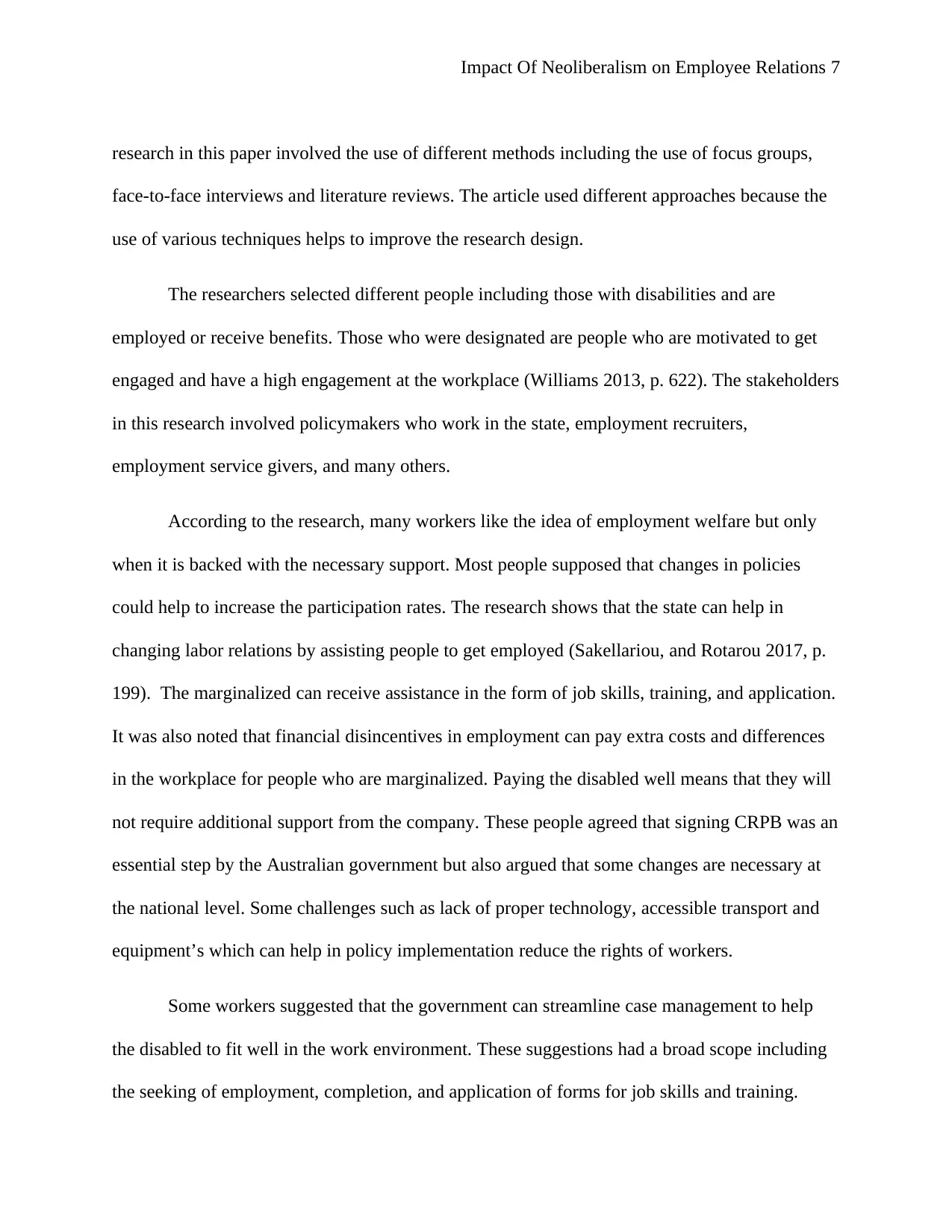
Impact Of Neoliberalism on Employee Relations 7
research in this paper involved the use of different methods including the use of focus groups,
face-to-face interviews and literature reviews. The article used different approaches because the
use of various techniques helps to improve the research design.
The researchers selected different people including those with disabilities and are
employed or receive benefits. Those who were designated are people who are motivated to get
engaged and have a high engagement at the workplace (Williams 2013, p. 622). The stakeholders
in this research involved policymakers who work in the state, employment recruiters,
employment service givers, and many others.
According to the research, many workers like the idea of employment welfare but only
when it is backed with the necessary support. Most people supposed that changes in policies
could help to increase the participation rates. The research shows that the state can help in
changing labor relations by assisting people to get employed (Sakellariou, and Rotarou 2017, p.
199). The marginalized can receive assistance in the form of job skills, training, and application.
It was also noted that financial disincentives in employment can pay extra costs and differences
in the workplace for people who are marginalized. Paying the disabled well means that they will
not require additional support from the company. These people agreed that signing CRPB was an
essential step by the Australian government but also argued that some changes are necessary at
the national level. Some challenges such as lack of proper technology, accessible transport and
equipment’s which can help in policy implementation reduce the rights of workers.
Some workers suggested that the government can streamline case management to help
the disabled to fit well in the work environment. These suggestions had a broad scope including
the seeking of employment, completion, and application of forms for job skills and training.
research in this paper involved the use of different methods including the use of focus groups,
face-to-face interviews and literature reviews. The article used different approaches because the
use of various techniques helps to improve the research design.
The researchers selected different people including those with disabilities and are
employed or receive benefits. Those who were designated are people who are motivated to get
engaged and have a high engagement at the workplace (Williams 2013, p. 622). The stakeholders
in this research involved policymakers who work in the state, employment recruiters,
employment service givers, and many others.
According to the research, many workers like the idea of employment welfare but only
when it is backed with the necessary support. Most people supposed that changes in policies
could help to increase the participation rates. The research shows that the state can help in
changing labor relations by assisting people to get employed (Sakellariou, and Rotarou 2017, p.
199). The marginalized can receive assistance in the form of job skills, training, and application.
It was also noted that financial disincentives in employment can pay extra costs and differences
in the workplace for people who are marginalized. Paying the disabled well means that they will
not require additional support from the company. These people agreed that signing CRPB was an
essential step by the Australian government but also argued that some changes are necessary at
the national level. Some challenges such as lack of proper technology, accessible transport and
equipment’s which can help in policy implementation reduce the rights of workers.
Some workers suggested that the government can streamline case management to help
the disabled to fit well in the work environment. These suggestions had a broad scope including
the seeking of employment, completion, and application of forms for job skills and training.
Paraphrase This Document
Need a fresh take? Get an instant paraphrase of this document with our AI Paraphraser
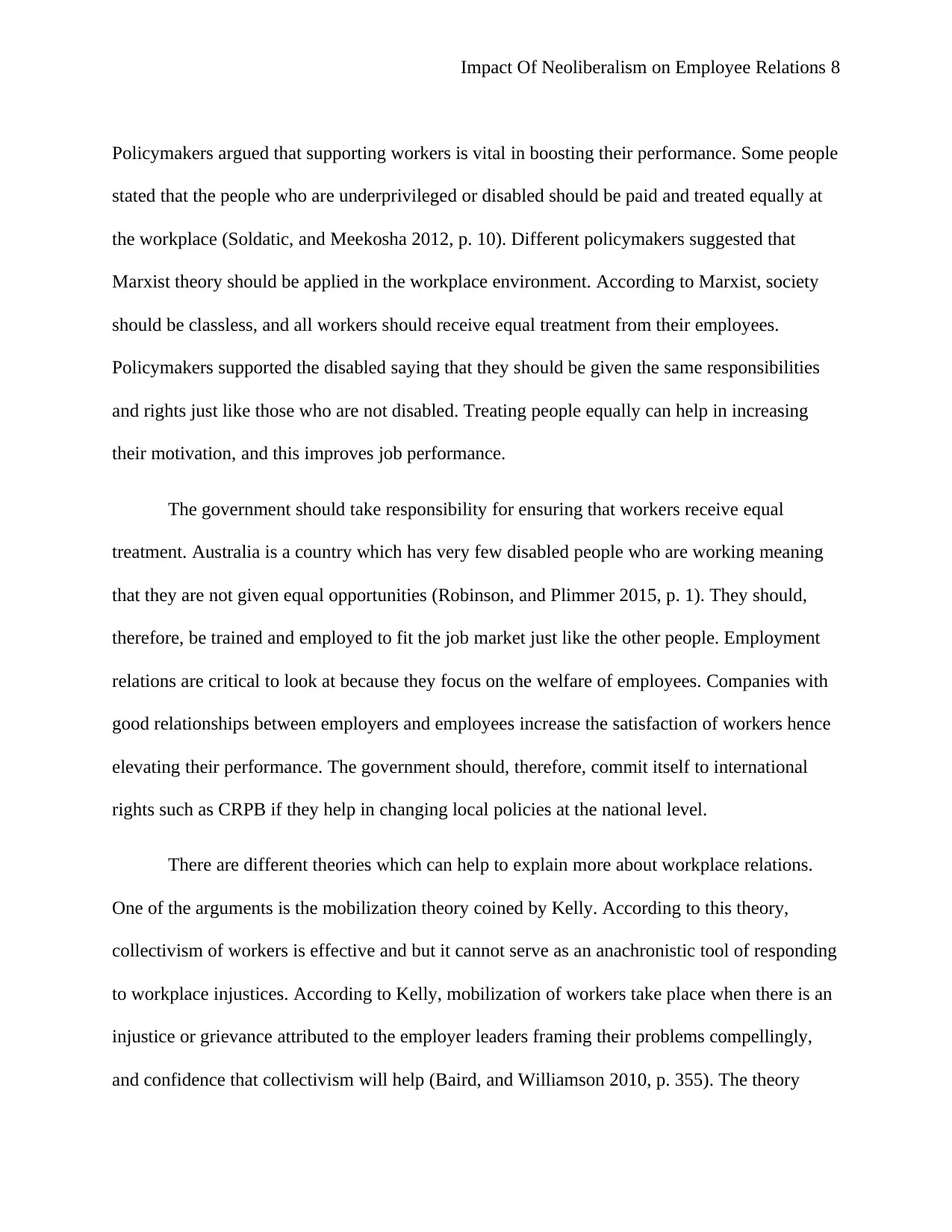
Impact Of Neoliberalism on Employee Relations 8
Policymakers argued that supporting workers is vital in boosting their performance. Some people
stated that the people who are underprivileged or disabled should be paid and treated equally at
the workplace (Soldatic, and Meekosha 2012, p. 10). Different policymakers suggested that
Marxist theory should be applied in the workplace environment. According to Marxist, society
should be classless, and all workers should receive equal treatment from their employees.
Policymakers supported the disabled saying that they should be given the same responsibilities
and rights just like those who are not disabled. Treating people equally can help in increasing
their motivation, and this improves job performance.
The government should take responsibility for ensuring that workers receive equal
treatment. Australia is a country which has very few disabled people who are working meaning
that they are not given equal opportunities (Robinson, and Plimmer 2015, p. 1). They should,
therefore, be trained and employed to fit the job market just like the other people. Employment
relations are critical to look at because they focus on the welfare of employees. Companies with
good relationships between employers and employees increase the satisfaction of workers hence
elevating their performance. The government should, therefore, commit itself to international
rights such as CRPB if they help in changing local policies at the national level.
There are different theories which can help to explain more about workplace relations.
One of the arguments is the mobilization theory coined by Kelly. According to this theory,
collectivism of workers is effective and but it cannot serve as an anachronistic tool of responding
to workplace injustices. According to Kelly, mobilization of workers take place when there is an
injustice or grievance attributed to the employer leaders framing their problems compellingly,
and confidence that collectivism will help (Baird, and Williamson 2010, p. 355). The theory
Policymakers argued that supporting workers is vital in boosting their performance. Some people
stated that the people who are underprivileged or disabled should be paid and treated equally at
the workplace (Soldatic, and Meekosha 2012, p. 10). Different policymakers suggested that
Marxist theory should be applied in the workplace environment. According to Marxist, society
should be classless, and all workers should receive equal treatment from their employees.
Policymakers supported the disabled saying that they should be given the same responsibilities
and rights just like those who are not disabled. Treating people equally can help in increasing
their motivation, and this improves job performance.
The government should take responsibility for ensuring that workers receive equal
treatment. Australia is a country which has very few disabled people who are working meaning
that they are not given equal opportunities (Robinson, and Plimmer 2015, p. 1). They should,
therefore, be trained and employed to fit the job market just like the other people. Employment
relations are critical to look at because they focus on the welfare of employees. Companies with
good relationships between employers and employees increase the satisfaction of workers hence
elevating their performance. The government should, therefore, commit itself to international
rights such as CRPB if they help in changing local policies at the national level.
There are different theories which can help to explain more about workplace relations.
One of the arguments is the mobilization theory coined by Kelly. According to this theory,
collectivism of workers is effective and but it cannot serve as an anachronistic tool of responding
to workplace injustices. According to Kelly, mobilization of workers take place when there is an
injustice or grievance attributed to the employer leaders framing their problems compellingly,
and confidence that collectivism will help (Baird, and Williamson 2010, p. 355). The theory
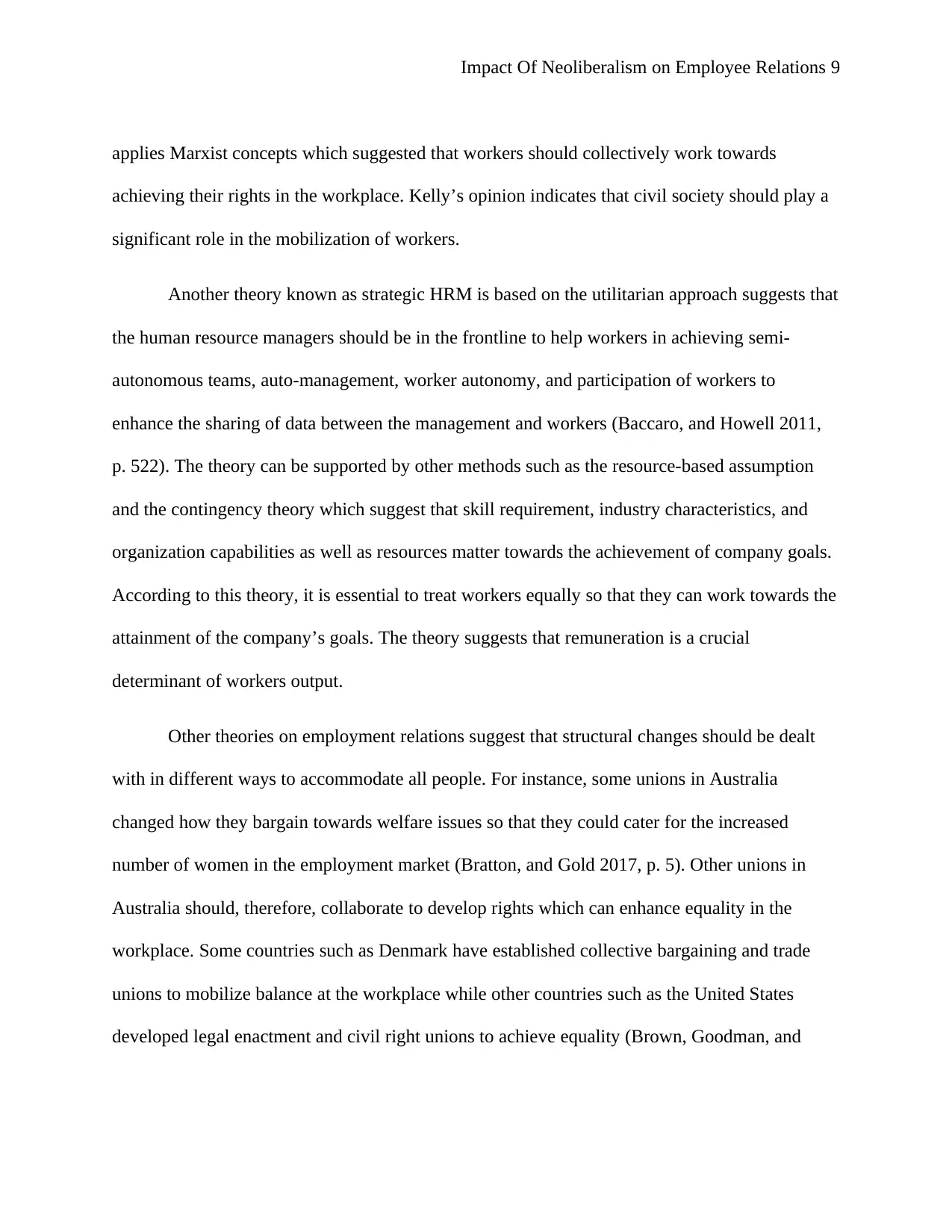
Impact Of Neoliberalism on Employee Relations 9
applies Marxist concepts which suggested that workers should collectively work towards
achieving their rights in the workplace. Kelly’s opinion indicates that civil society should play a
significant role in the mobilization of workers.
Another theory known as strategic HRM is based on the utilitarian approach suggests that
the human resource managers should be in the frontline to help workers in achieving semi-
autonomous teams, auto-management, worker autonomy, and participation of workers to
enhance the sharing of data between the management and workers (Baccaro, and Howell 2011,
p. 522). The theory can be supported by other methods such as the resource-based assumption
and the contingency theory which suggest that skill requirement, industry characteristics, and
organization capabilities as well as resources matter towards the achievement of company goals.
According to this theory, it is essential to treat workers equally so that they can work towards the
attainment of the company’s goals. The theory suggests that remuneration is a crucial
determinant of workers output.
Other theories on employment relations suggest that structural changes should be dealt
with in different ways to accommodate all people. For instance, some unions in Australia
changed how they bargain towards welfare issues so that they could cater for the increased
number of women in the employment market (Bratton, and Gold 2017, p. 5). Other unions in
Australia should, therefore, collaborate to develop rights which can enhance equality in the
workplace. Some countries such as Denmark have established collective bargaining and trade
unions to mobilize balance at the workplace while other countries such as the United States
developed legal enactment and civil right unions to achieve equality (Brown, Goodman, and
applies Marxist concepts which suggested that workers should collectively work towards
achieving their rights in the workplace. Kelly’s opinion indicates that civil society should play a
significant role in the mobilization of workers.
Another theory known as strategic HRM is based on the utilitarian approach suggests that
the human resource managers should be in the frontline to help workers in achieving semi-
autonomous teams, auto-management, worker autonomy, and participation of workers to
enhance the sharing of data between the management and workers (Baccaro, and Howell 2011,
p. 522). The theory can be supported by other methods such as the resource-based assumption
and the contingency theory which suggest that skill requirement, industry characteristics, and
organization capabilities as well as resources matter towards the achievement of company goals.
According to this theory, it is essential to treat workers equally so that they can work towards the
attainment of the company’s goals. The theory suggests that remuneration is a crucial
determinant of workers output.
Other theories on employment relations suggest that structural changes should be dealt
with in different ways to accommodate all people. For instance, some unions in Australia
changed how they bargain towards welfare issues so that they could cater for the increased
number of women in the employment market (Bratton, and Gold 2017, p. 5). Other unions in
Australia should, therefore, collaborate to develop rights which can enhance equality in the
workplace. Some countries such as Denmark have established collective bargaining and trade
unions to mobilize balance at the workplace while other countries such as the United States
developed legal enactment and civil right unions to achieve equality (Brown, Goodman, and
⊘ This is a preview!⊘
Do you want full access?
Subscribe today to unlock all pages.

Trusted by 1+ million students worldwide
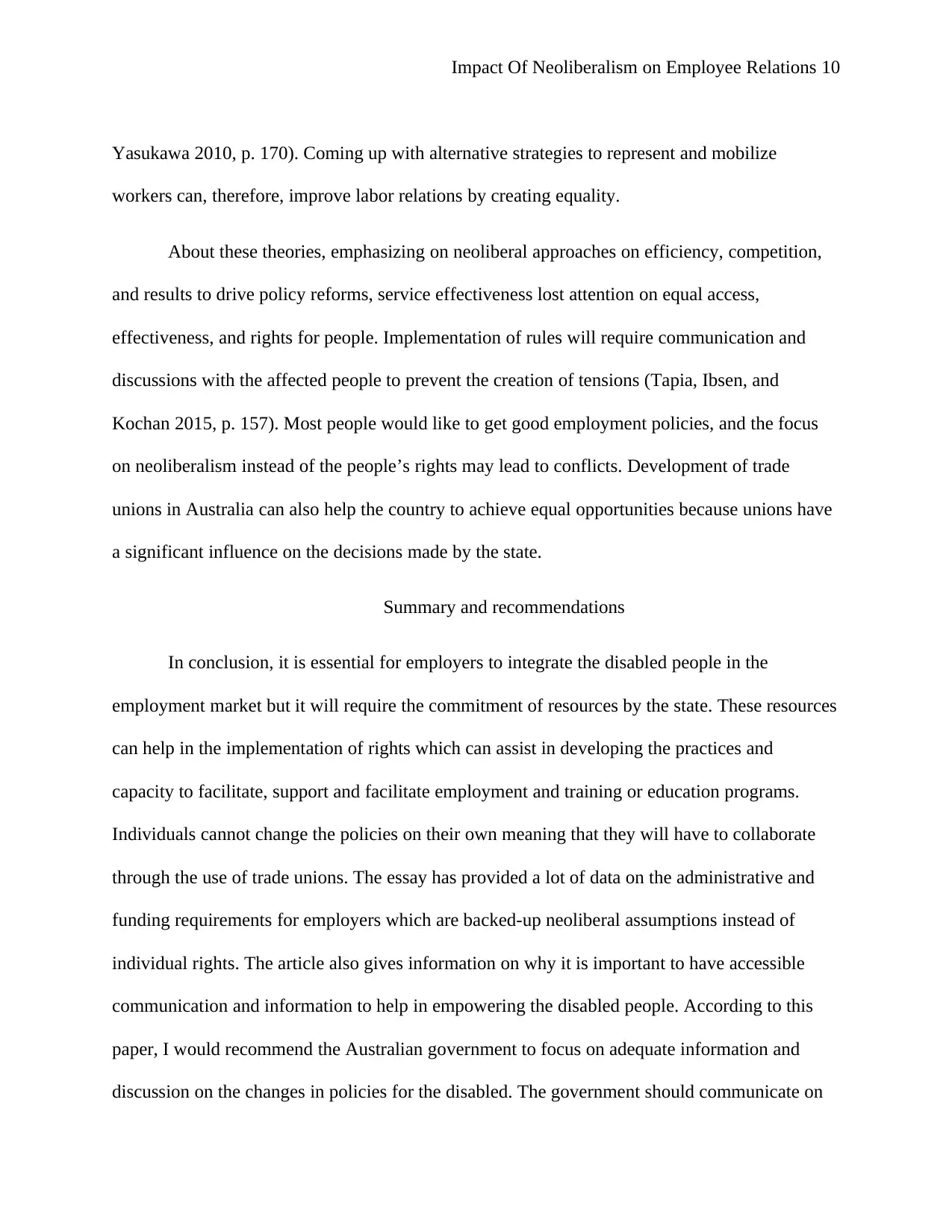
Impact Of Neoliberalism on Employee Relations 10
Yasukawa 2010, p. 170). Coming up with alternative strategies to represent and mobilize
workers can, therefore, improve labor relations by creating equality.
About these theories, emphasizing on neoliberal approaches on efficiency, competition,
and results to drive policy reforms, service effectiveness lost attention on equal access,
effectiveness, and rights for people. Implementation of rules will require communication and
discussions with the affected people to prevent the creation of tensions (Tapia, Ibsen, and
Kochan 2015, p. 157). Most people would like to get good employment policies, and the focus
on neoliberalism instead of the people’s rights may lead to conflicts. Development of trade
unions in Australia can also help the country to achieve equal opportunities because unions have
a significant influence on the decisions made by the state.
Summary and recommendations
In conclusion, it is essential for employers to integrate the disabled people in the
employment market but it will require the commitment of resources by the state. These resources
can help in the implementation of rights which can assist in developing the practices and
capacity to facilitate, support and facilitate employment and training or education programs.
Individuals cannot change the policies on their own meaning that they will have to collaborate
through the use of trade unions. The essay has provided a lot of data on the administrative and
funding requirements for employers which are backed-up neoliberal assumptions instead of
individual rights. The article also gives information on why it is important to have accessible
communication and information to help in empowering the disabled people. According to this
paper, I would recommend the Australian government to focus on adequate information and
discussion on the changes in policies for the disabled. The government should communicate on
Yasukawa 2010, p. 170). Coming up with alternative strategies to represent and mobilize
workers can, therefore, improve labor relations by creating equality.
About these theories, emphasizing on neoliberal approaches on efficiency, competition,
and results to drive policy reforms, service effectiveness lost attention on equal access,
effectiveness, and rights for people. Implementation of rules will require communication and
discussions with the affected people to prevent the creation of tensions (Tapia, Ibsen, and
Kochan 2015, p. 157). Most people would like to get good employment policies, and the focus
on neoliberalism instead of the people’s rights may lead to conflicts. Development of trade
unions in Australia can also help the country to achieve equal opportunities because unions have
a significant influence on the decisions made by the state.
Summary and recommendations
In conclusion, it is essential for employers to integrate the disabled people in the
employment market but it will require the commitment of resources by the state. These resources
can help in the implementation of rights which can assist in developing the practices and
capacity to facilitate, support and facilitate employment and training or education programs.
Individuals cannot change the policies on their own meaning that they will have to collaborate
through the use of trade unions. The essay has provided a lot of data on the administrative and
funding requirements for employers which are backed-up neoliberal assumptions instead of
individual rights. The article also gives information on why it is important to have accessible
communication and information to help in empowering the disabled people. According to this
paper, I would recommend the Australian government to focus on adequate information and
discussion on the changes in policies for the disabled. The government should communicate on
Paraphrase This Document
Need a fresh take? Get an instant paraphrase of this document with our AI Paraphraser

Impact Of Neoliberalism on Employee Relations 11
the changes in guidelines to ensure that everyone understands their importance. The government
should focus on dogmas, and legislation which can provide more responsive and accessible
services to the disabled.
the changes in guidelines to ensure that everyone understands their importance. The government
should focus on dogmas, and legislation which can provide more responsive and accessible
services to the disabled.
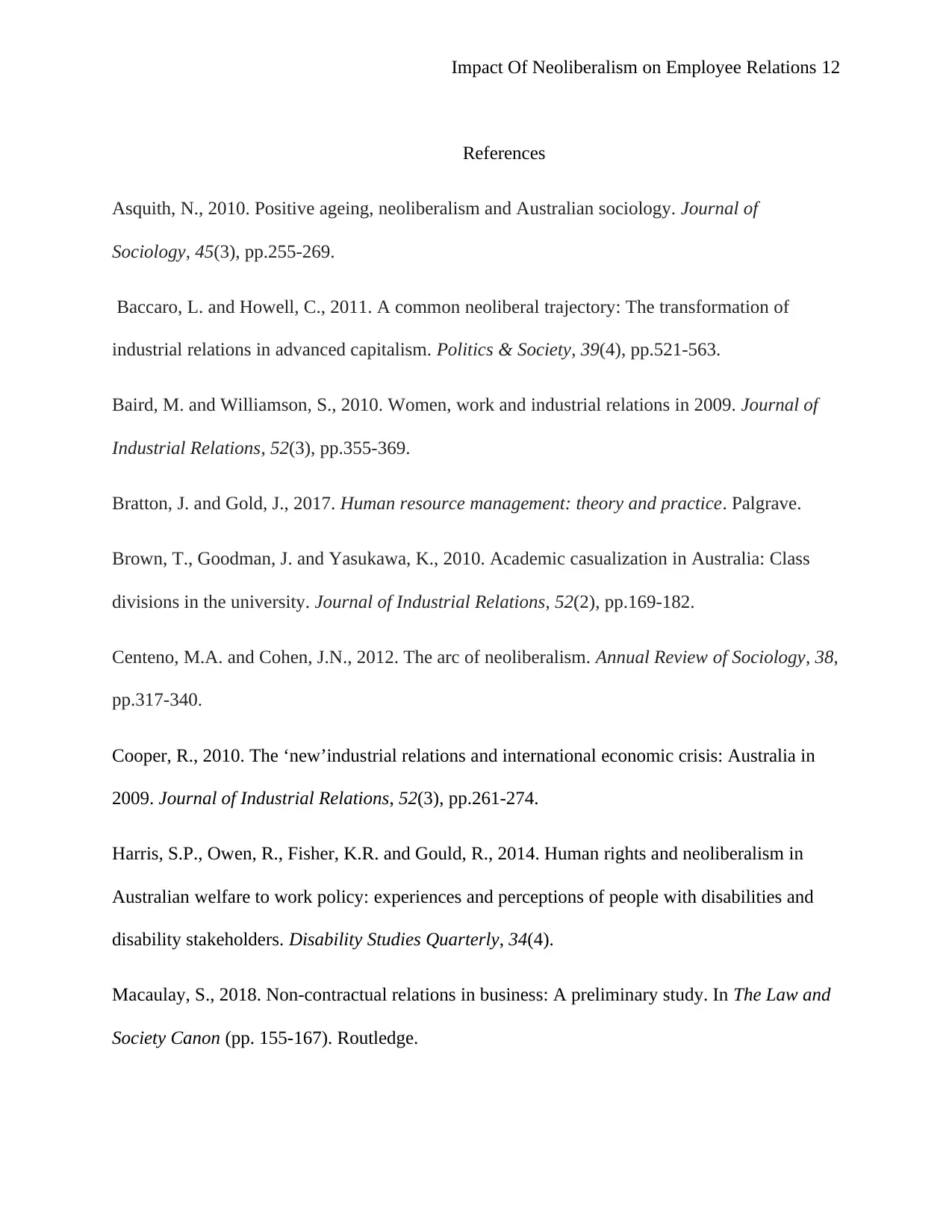
Impact Of Neoliberalism on Employee Relations 12
References
Asquith, N., 2010. Positive ageing, neoliberalism and Australian sociology. Journal of
Sociology, 45(3), pp.255-269.
Baccaro, L. and Howell, C., 2011. A common neoliberal trajectory: The transformation of
industrial relations in advanced capitalism. Politics & Society, 39(4), pp.521-563.
Baird, M. and Williamson, S., 2010. Women, work and industrial relations in 2009. Journal of
Industrial Relations, 52(3), pp.355-369.
Bratton, J. and Gold, J., 2017. Human resource management: theory and practice. Palgrave.
Brown, T., Goodman, J. and Yasukawa, K., 2010. Academic casualization in Australia: Class
divisions in the university. Journal of Industrial Relations, 52(2), pp.169-182.
Centeno, M.A. and Cohen, J.N., 2012. The arc of neoliberalism. Annual Review of Sociology, 38,
pp.317-340.
Cooper, R., 2010. The ‘new’industrial relations and international economic crisis: Australia in
2009. Journal of Industrial Relations, 52(3), pp.261-274.
Harris, S.P., Owen, R., Fisher, K.R. and Gould, R., 2014. Human rights and neoliberalism in
Australian welfare to work policy: experiences and perceptions of people with disabilities and
disability stakeholders. Disability Studies Quarterly, 34(4).
Macaulay, S., 2018. Non-contractual relations in business: A preliminary study. In The Law and
Society Canon (pp. 155-167). Routledge.
References
Asquith, N., 2010. Positive ageing, neoliberalism and Australian sociology. Journal of
Sociology, 45(3), pp.255-269.
Baccaro, L. and Howell, C., 2011. A common neoliberal trajectory: The transformation of
industrial relations in advanced capitalism. Politics & Society, 39(4), pp.521-563.
Baird, M. and Williamson, S., 2010. Women, work and industrial relations in 2009. Journal of
Industrial Relations, 52(3), pp.355-369.
Bratton, J. and Gold, J., 2017. Human resource management: theory and practice. Palgrave.
Brown, T., Goodman, J. and Yasukawa, K., 2010. Academic casualization in Australia: Class
divisions in the university. Journal of Industrial Relations, 52(2), pp.169-182.
Centeno, M.A. and Cohen, J.N., 2012. The arc of neoliberalism. Annual Review of Sociology, 38,
pp.317-340.
Cooper, R., 2010. The ‘new’industrial relations and international economic crisis: Australia in
2009. Journal of Industrial Relations, 52(3), pp.261-274.
Harris, S.P., Owen, R., Fisher, K.R. and Gould, R., 2014. Human rights and neoliberalism in
Australian welfare to work policy: experiences and perceptions of people with disabilities and
disability stakeholders. Disability Studies Quarterly, 34(4).
Macaulay, S., 2018. Non-contractual relations in business: A preliminary study. In The Law and
Society Canon (pp. 155-167). Routledge.
⊘ This is a preview!⊘
Do you want full access?
Subscribe today to unlock all pages.

Trusted by 1+ million students worldwide
1 out of 14
Related Documents
Your All-in-One AI-Powered Toolkit for Academic Success.
+13062052269
info@desklib.com
Available 24*7 on WhatsApp / Email
![[object Object]](/_next/static/media/star-bottom.7253800d.svg)
Unlock your academic potential
Copyright © 2020–2026 A2Z Services. All Rights Reserved. Developed and managed by ZUCOL.





